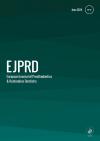European Journal of Prosthodontics and Restorative Dentistry
Automated Identification of Dental Implants: A New, Fast and Accurate Artificial Intelligence System
Abstract
Introduction: Prosthetic complications that occur to some implant prosthetics may require removal of the prosthesis for replacement or repair. Therefore, the presence of a technique to identify the type of dental implant is mandatory to provide the suitable components. Hence, the aim of the current study was to evaluate the accuracy of YOLOv8 object detection algorithm in automatic identification of the type of dental implant from digital periapical radiographs. Methods: YOLOv8m-seg object detection algorithm was used to build a model to automatically identify the type of dental implant. A set of 2573 digital periapical radiographs for six distinct dental implants manufacturers were used to train the model. The outcomes were evaluated using precision, recall, F1 score and mAP. Results: The overall accuracy of the YOLOv8m-seg model in terms of precision, recall, F1 score and mAP revealed values of 0.919, 0.98, 0.95 and 0.972 respectively. The average detection speed of the images was 1.3 seconds. The model was able to detect and identify multiple implants simultaneously on the same image. Conclusions: YOLOv8m-seg object detection algorithm is promising in identification of dental implants from periapical radiographs with high detection accuracy (97.2%), fast detection results and multi-implant detection from the same image. Clinical Significance: This AI system
can accurately identify the type of osseointegrated dental implants enabling dentists to provide the appropriate prosthetic components even if different implant systems are used within the same patient. This can save tremendous amounts of time, effort and cost for both the dentist and the patient.
Keywords
Artificial Intelligence
Dental Implant
ComputerVision
Object Detection
YOLOv8
Periapical Radiographs
Authors
Nermeen A. Hassan, Amr E. Kamel, Arwa E. Omran, Michael W. Gad, Nourhan M. Ashraf, Omnia M. Ahmed, Manal A. Abdel-Fattah
Articles from this issue
 Free Access
Free Access No Access
No Access Full Access
Full Access


